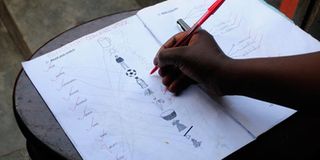Why coaching is still practiced by schools

A teacher marks an English exercise done during coaching. Although the practice is not allowed, schools still go ahead to coach their pupils and students because they want them to pass with high grades. photos by Faiswal Kasirye
What you need to know:
Although the ministry of education banned coaching, many schools still carry out the practice with some charging a lot of money for it and others even go ahead to teach parts of the syllabus.
When Ms Peninah Orishaba’s three children broke off for the holidays last December, she wondered how she would be able to control their movements and know their whereabouts all the time. After a week at home, she decided to find them a school in their neighbourhood, Namuwongo, a Kampala suburb, where they spent their morning hours coaching.
Orishaba like many other parents, feel somewhat inconvenienced when the children come home, for especially long holidays. She argues that once they are home, her house is disorderly and that they also limit her from going to work (she is a business woman). That is why she doesn’t care how much she pays these teachers as long as they can keep her girls busy.
Setting a bad trend
But education experts worry that this growing trend among parents has caused children to become unruly as their guardians don’t have time for them.
Dr Daniel Nkaada, the commissioner, primary education in the ministry of education, says parents have failed to appreciate the government’s policy which outlawed coaching especially during holidays, and adds that while they as the ministry are aware that they need to do a lot of surveillance, it is difficult because they have limited human resource and yet there are many schools.
According to Dr Nkaada, their work is made even more complicated by some parents who connive with teachers and hide their children in unsecure buildings which put the children at risk.
“People hide children in garages and stores. We shall continue talking about it. Police can’t apprehend these people. But the public should know that coaching was outlawed,” Dr Nkaada says.
He warns that for children to be productive, they need to get enough rest at a tender age, something many parents have ignored. “Parents think being in school 24 hours is good. The boys and girls need to play. They need to rest. The time allocated on the school timetable is enough. Those extra hours of study strain the child. The brain gets tired and the effect is long term,” he warns.
“The girl is the most delicate. If they are not protected because you are hiding them in places where they can’t be detected, some people can take advantage. That is why you hear of defilement on the rise,” he says.
Ms Frances Atima, acting principal inspector in the Directorate of Education Standards, said coaching has been misused by some individuals who have commercialised it.
“The amount of coaching is not as bad as it used to be but certainly it’s still a challenge. We have been getting information but the cases are minimal during first term holiday. The climax is second term when candidates are preparing for final exams in third term,” Atima says.
Remedial work vs coaching
She defines coaching as drilling of learners so that they can pass, while remedial work, is where they encourage people to deal with particular weaknesses of children, because they have different learning abilities, by having them study extra hours to help them understand concepts they have not understood in class.
“Coaching would not have been bad. The problem was that people abused it. The teachers were not looking at the different needs of the learners. We are so exam-oriented and the way the public views schools is according to how many students a school has been able to produce in first grade,” Ms Atima explains.
She adds that it has now created competition especially among private schools whose head teachers work under pressure from proprietors.
“Many think that to be successful you must be in first grade. This puts schools under a lot of pressure because school owners tell their head teachers that if they don’t pass their candidates well, they will lose their jobs. Enrolment increases when many students pass and this means the proprietors can increase fees because it is a business as well,” Atima says.
In some schools, teachers have insisted on coaching during the school term where they continue with the curriculum. This means that a child who fails to pay coaching fees misses out as the topics are not repeated during the normal time table. For those that can afford, the fees can sometimes be high.
Rehema Nakato for instance parted with Shs1m for coaching alone last year. She paid Shs100,000 for each of the subjects Mathematics, Chemistry and Physics per term for her daughter who was in Senior Four and Biology which she was coached in, only in third term.
“Although I know it is wrong, I wanted my daughter to pass. The teachers are not paid well in government schools. So they charge some money for the extra work they do out of their time table,” Nakato says. She adds that teachers charge depending on how they evaluate the parent’s ability to pay, hence the fees are not standard for all the students.
A money-making scheme
Atima explains that this is because many teachers have made coaching a business in order to get some money in addition to their salary.
“These are professional issues. If you are coaching, why don’t you teach what you had already taught in class, why continue with the syllabus with a fraction of your class? This means that those who don’t have money miss out on what is covered in this period and parents are put under pressure to find both fees and coaching money at the same time,” Atima says.
Ms Nakate Kikomeko, Trinity College, Nabbingo head teacher and also chairperson National Association of Secondary School Head Teachers of Uganda says that it is important that teachers do remedial work with their students who are slow learners to help them be on the same page with the rest of the students but warned that this shouldn’t be at a fee.
That said, as long as there is no all-round and strict surveillance done by the ministry of education, schools will continue to insist that students are coached.
Effects of coaching
Mr Alfred Niwagaba, the head teacher, Little Angels PS, Ntungamo, blames parents for failing to find time for their children. He said that sometimes schools are put under pressure by parents to conduct coaching because they don’t want to retain their children at home.
“Parents insist that schools keep their children. They don’t want to have them at home. The children in turn fail to know their parents. They lose confidence in them and instead of letting mum and dad know what is bothering them, they come to us.
“You find that in some homes, computers and phones have become parents to these children. A child no longer sees a parent as a friend because they have not bonded,” he says.




